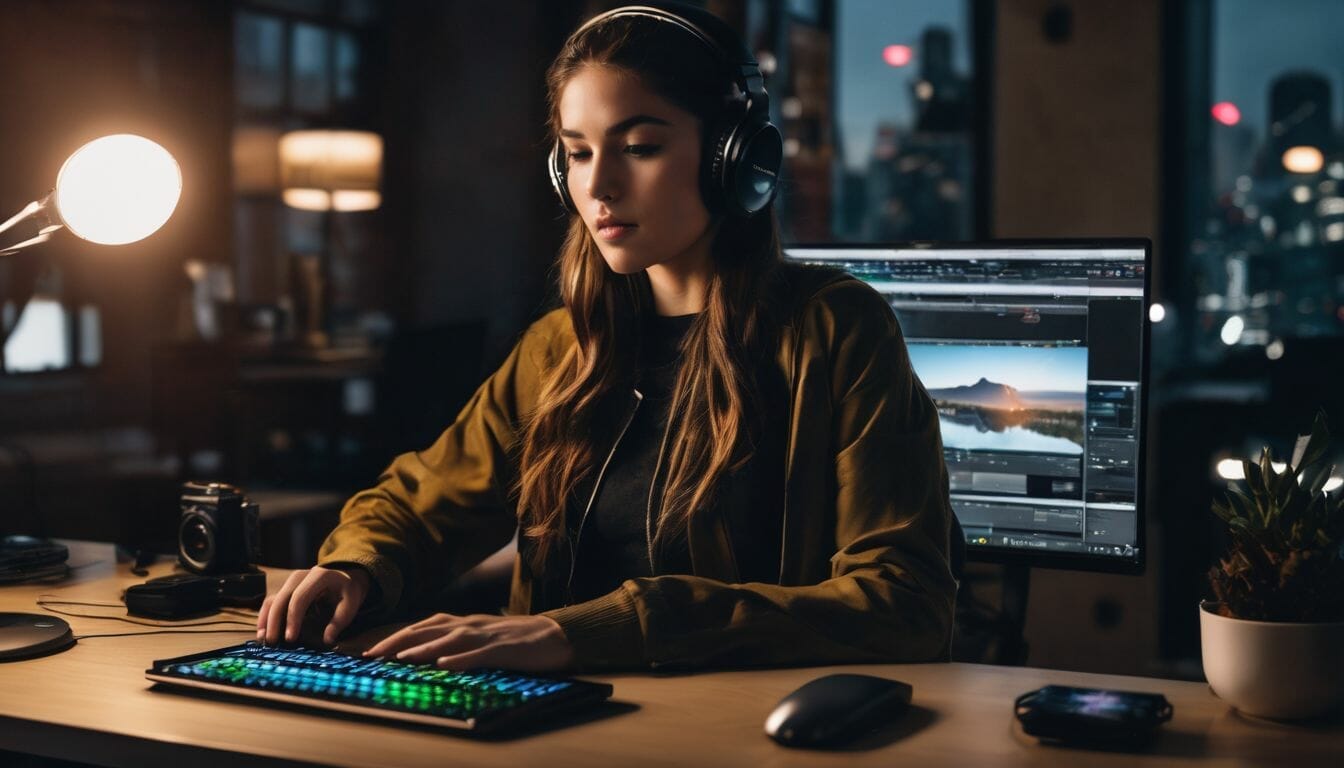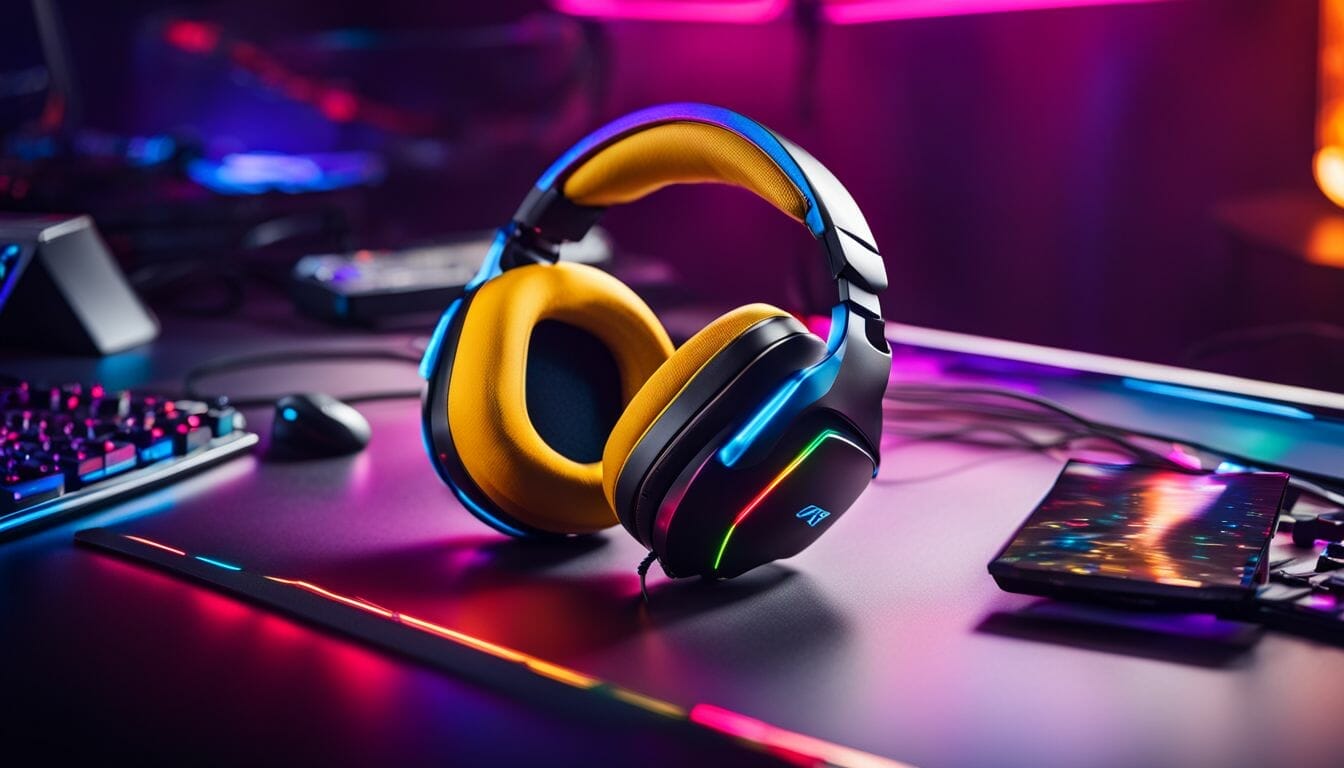Sound Decisions: Do I Need a Sound Card for Gaming?

Wondering if adding a sound card to your setup could noticeably enhance your gaming experience? We’ve been thinking about that too. Indeed, it has ignited discussions among PC gamers across the globe.
Over the years, built-in audio technology on motherboards has dramatically improved, leading many to wonder if a dedicated sound card is still worth the investment. This article will delve into what a sound card does, how it can possibly enrich your gaming escapades and factors to consider when deciding whether or not to invest in one.
Ready for a deep dive into the world of computer audio technology? Let’s jump right in!
Key Takeaways
- A sound card is a hardware device that converts digital information into analog audio signals, allowing you to hear sounds through headphones or speakers when gaming.
- Sound cards play a big role in gaming by providing immersive experiences, enhancing spatial awareness, and improving communication with teammates.
- While built-in audio on motherboards can suffice for basic usage, dedicated sound cards offer enhanced audio quality, advanced customization options, reduced audio delay, and synchronized in-game sounds. Investing in a high-end sound card can greatly enhance the overall gaming experience.
What is a Sound Card?

A sound card, also known as an audio card or a sound adapter, is a hardware device that enables your computer to output and process audio signals. It plays a crucial role in providing high-quality sound for gaming by converting digital information into analog audio signals that can be heard through speakers or headphones.
Definition and purpose
A sound card is a part we add to our computer. It’s also called an audio card. It helps us hear sounds when we plug in headphones or speakers. The job of a sound card is simple but important.
When the computer makes digital sound information, the sound card changes it into real sounds that we can hear. This change happens from digital data to analog sound and back again so you can enjoy your games fully! Sound cards are sometimes built inside computers but other times, they need to be added separately.
Types of sound cards
Let’s look at the different types of sound cards out there. There are many kinds in the world of sound interfaces. First, we’ve got gaming sound cards. These provide top-grade audio for our games. Next, we have professional sound cards. These are popular with people who make or edit music and videos. Then there are internal sound cards that fit inside your PC. External sound cards sit outside of your PC and can be moved around easily. Audio production cards help record high-quality sounds, while audio processing cards tweak sounds to make them better. All these types give your PC the ability to do different things with sound!
Role in gaming
A sound card plays a big part in gaming. It lets us hear sounds from our PC. Using an audio card, we can feel like we are inside the game world. The sounds of footsteps or gunfire help us know where other players are in the game.
This is because it changes 3D sound into stereo output for our headphones. For many games, good sound helps make play better and more fun! If you want top-notch audio, think about getting a high-end sound card.
That makes your headphone audio or speaker output even better!
Importance of Sound in Gaming

Sound in gaming is crucial as it enhances the immersive experience by providing realistic audio cues and effects that transport players into the game world.
Immersive experience
As PC gamers, we all want to get lost in the virtual worlds of our favorite games. We want to feel like we’re right there in the action, experiencing every moment as if it were real life.
And that’s where sound comes in. An immersive experience is all about the combination of audio and visual effects working together to transport us into another world. Whether it’s the sound of footsteps creeping up behind us or the roar of an explosion shaking the ground beneath us, a good sound card can make all the difference.
It brings depth and realism to our gaming setup, making each moment more intense and captivating. So if you want to truly immerse yourself in your games, a quality sound card is definitely worth considering.
Spatial awareness
Spatial awareness is a crucial aspect of gaming that is greatly influenced by sound. With the right sound card, you can experience immersive and realistic audio environments that enhance your spatial awareness while playing games.
Spatial sound creates the illusion that sounds are coming from different directions in a 3D space, making it easier to locate enemies or important game elements. This not only adds to the overall immersion but also improves your ability to mentally rotate objects and navigate through virtual environments.
So, having a good sound card can definitely enhance your gaming experience by improving your spatial awareness skills.
Communication
Clear and realistic communication is crucial in gaming. Good sound quality allows you to hear your teammates’ voices clearly, making it easier to strategize and coordinate your moves.
It also helps you stay aware of what is happening around you in the game, allowing for better teamwork and reaction times. With the right audio setup, you can fully immerse yourself in virtual worlds and experience games like never before.
So make sure to consider the importance of communication when deciding whether or not to invest in a sound card for gaming.
Built-in Audio vs Dedicated Sound Card
When it comes to the debate between built-in audio and a dedicated sound card for gaming, there are pros and cons to consider. But if you’re serious about achieving the best audio experience in your games, then a dedicated sound card might be worth investing in.
Keep reading to find out why!
Pros and cons of built-in audio
Let’s delve into the pros and cons of built-in audio, an important aspect to consider for PC gamers.
| Pros | Cons |
|---|---|
| Most modern computers come with integrated audio capabilities, eliminating the need for a separate sound card for basic usage. | The sound quality of built-in audio can be inferior compared to dedicated sound cards. |
| Integrated audio is more cost-effective as it doesn’t require additional hardware purchases. | Some PC gamers find their built-in audio lacking when using headphones, depending on personal preferences and quality of the built-in audio. |
| The integration of sound cards into motherboards has reduced the need for separate sound card purchases, making it a convenient option. | Although often satisfactory for casual usage, built-in audio might not deliver the same immersive experience or spatial awareness as a dedicated sound card in gaming. |
It’s worth noting that the perceived difference in sound quality between integrated and added sound cards is subjective and dependent on individual perception and preferences. Therefore, your decision should be based on your own specific needs and wants as a PC gamer.
Benefits of a dedicated sound card
Dedicated sound cards bring many benefits to gamers. One major advantage is enhanced audio quality. With a dedicated sound card, you can enjoy superior sound clarity and improved audio performance compared to built-in audio on a motherboard.
This means that your gaming experience will be more immersive, with realistic and detailed sound effects that truly bring the game world to life.
Another benefit of a dedicated sound card is advanced customization options. These cards offer features like equalizers, virtual surround sound, and various audio presets so that you can tailor the audio settings to your preferences.
Whether you want booming bass for action-packed games or crisp highs for more subtle sounds, a dedicated sound card allows for precise control over your gaming audio.
Furthermore, dedicated sound cards can reduce audio delay and ensure synchronized in-game sounds. This means that when you hear an explosion or footsteps in the game, they will match up perfectly with what’s happening on-screen without any lag or delay.
This enhances both your gameplay experience and competitive edge by allowing you to react faster to in-game events based on accurate auditory cues.
Factors to consider when deciding
Here are some important factors to consider when deciding whether you need a sound card for gaming:
- Purpose of use: Think about how you plan to use your computer. Are you primarily using it for gaming or do you have other audio-intensive tasks like music production? This will help determine if a dedicated sound card is necessary.
- Gaming performance: If you’re an avid gamer, a dedicated sound card can enhance your gaming experience by providing better audio quality and reducing lag.
- Computer specifications: Check your computer’s specifications and see if it meets the minimum requirements for running a sound card. Make sure you have an available slot on your motherboard and enough power supply to support the additional hardware.
- Audio quality: Consider the overall quality of your computer’s sound output. If you find that the built-in audio lacks clarity, depth, or richness, a dedicated sound card might be worth considering.
- Signal-to-noise ratio: Look for a sound card with a high signal-to-noise ratio (SNR). A higher SNR means less background noise and clearer audio reproduction.
- Distortion levels: Pay attention to distortion levels in the specifications of different sound cards. Lower distortion levels result in more accurate audio representation.
- Amplification capabilities: If you use high-quality headphones or speakers that require more power to reach their full potential, a sound card with good amplification capabilities becomes important.
- External inputs: Consider if you need additional input options like line-in or microphone inputs for connecting external audio devices such as musical instruments or microphones.
- Audio devices compatibility: Ensure that the sound card is compatible with your existing audio devices like headphones or speakers.
- Budget considerations: Finally, think about how much you are willing to invest in improving your audio experience during gaming.
Factors to Consider When Choosing a Sound Card
When choosing a sound card for gaming, it is important to consider compatibility with your system, the audio quality it provides, available features and customization options, as well as your budget considerations.
Compatibility
When choosing a gaming sound card, compatibility is an important factor to consider. You want to make sure that the sound card you choose is compatible with your existing hardware, such as your motherboard or device.
USB sound cards, for example, need to be compatible with the device they are being connected to in order to ensure better audio quality. Some motherboards already come with built-in sound cards, so you may not need to purchase a separate one if yours has this feature.
Also, keep in mind that certain operating systems like Windows 10 PCs and laptops may require a dedicated sound card for enhanced audio capabilities. So before making your decision, it’s essential to check the compatibility of the gaming sound card you’re interested in and ensure it will work well with your setup.
Audio quality
The audio quality is an important aspect to consider when choosing a sound card for gaming. Different sound cards can have varying levels of audio quality, which can greatly impact your gaming experience.
For example, if you enjoy creating music in addition to gaming, having a sound card with better audio quality can make your music creations sound clearer and more professional. On the other hand, noisy sound cards can negatively affect the overall audio quality and might distract you from fully immersing yourself in the game.
Therefore, it is essential to select a sound card that provides excellent audio clarity and minimizes any unwanted noise or distortion.
Features and customization options
When choosing a sound card for gaming, there are some important features and customization options to consider. Here are the key things to look for:
- Audio Quality: A good sound card should provide high-quality audio with clear and crisp sound reproduction. This can enhance your gaming experience by making it more immersive and realistic.
- Surround Sound Capability: Some sound cards support surround sound setups, such as 5.1 or even higher, which can create a more immersive gaming environment. This allows you to hear sounds coming from different directions, giving you better spatial awareness in games.
- Analog-to-Digital Conversion: Sound cards convert analog audio signals into digital ones and vice versa. Look for a sound card that offers high-quality analog-to-digital conversion, as this ensures accurate and faithful reproduction of audio.
- USB Connectivity: USB sound cards offer flexibility and convenience as they can be connected to various devices easily. They often come with advanced features like virtual surround sound, customizable EQ settings, and microphone enhancements.
- Gaming Enhancement: Some sound cards come with specific features designed to enhance gaming performance. Examples include 3D audio processing, voice chat optimization, and game-specific presets that optimize audio for different genres.
- Video Playback Enhancement: If you also watch movies or videos on your PC, look for a sound card that enhances video playback quality. Features like noise reduction, dynamic range compensation, and bass management can significantly improve your multimedia experience.
Budget considerations
When choosing a sound card for gaming, budget considerations play a significant role. It’s important to find a sound card that fits within your budget while still meeting your needs.
Consider the compatibility of the sound card with your computer and other gaming peripherals. Think about the audio quality you desire and any specific features or customization options you may want.
Keep in mind that USB sound cards are often a popular choice due to their convenience and compatibility. Lastly, don’t forget to consider the warranty coverage when making your decision.
Conclusion: Do You Need a Sound Card for Gaming?
In conclusion, whether or not you need a sound card for gaming depends on your preferences and the level of audio quality you desire. While modern motherboards can provide sufficient audio performance, dedicated sound cards can greatly enhance the gaming experience, especially for intense games that rely heavily on immersive sound effects.
If you prioritize optimal audio quality and want to take your gaming experience to the next level, investing in a high-end sound card may be worth considering.
FAQs
1. Do I need a sound card for gaming?
No, most modern computers come with built-in sound cards that provide decent audio quality for gaming.
2. What does a sound card do for gaming?
A sound card enhances the audio quality and provides more realistic and immersive sound effects while playing games.
3. Are there any advantages of using a dedicated sound card for gaming?
Using a dedicated sound card can provide higher quality audio, better positional accuracy in games, and support for advanced features like surround sound or virtual reality.
4. Can I use headphones or speakers without a separate sound card for gaming?
Yes, you can use headphones or speakers directly connected to your computer’s built-in audio ports without needing an additional sound card.
5. How do I know if my computer has a built-in sound card?
You can check if your computer has a built-in sound card by looking at the specifications of your computer model or checking the device manager on your operating system to see if an audio device is listed.

